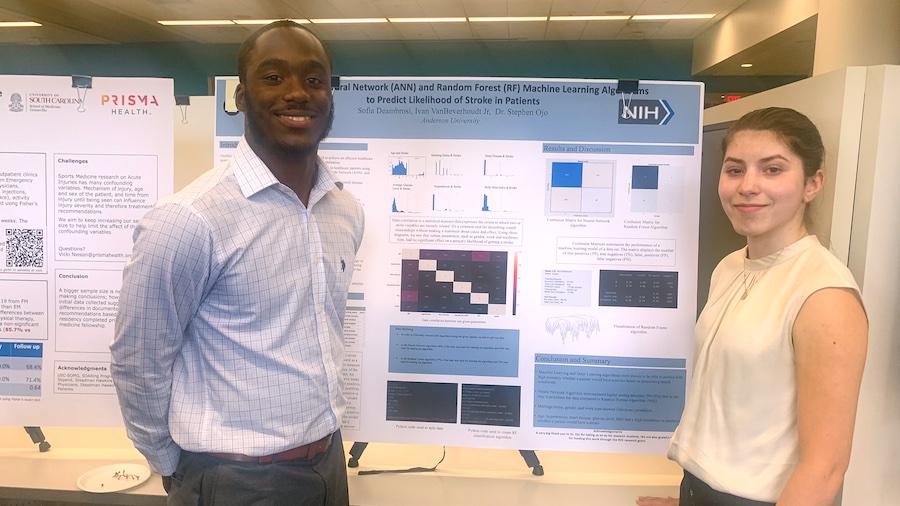Two Anderson University College of Engineering students received top honors at a research symposium recently.
Sofia Deambrosi and Ivan VanBeverhoudt Jr., presented a poster of their research July 14 at NIH R25, a research symposium held in Greenville, South Carolina. Out of many scholars that presented, their poster was selected as Best Poster.
Supervising the project as the research mentor was Anderson University Professor of Engineering Dr. Stephen Ojo, who was also with them at the symposium.
The research poster was titled “Using Artificial Neural Network (ANN) and Random Forrest (RF) Machine Learning Algorithms to Predict Likelihood of Stroke in Patients.”
In the presentation, Deambrosi, VanBeverhoudt and Ojo proposed two Artificial Intelligence (AI) and Machine Learning (ML) algorithms that can predict the likelihood of strokes in healthcare patients using extensive datasets and parameters. These algorithms are the Artificial Neural Wide Network (ANN) and the Random Forrest Classification (RF). The Neural Network Algorithm teaches computers to process data and information systems in a way that is similar to the human brain. It’s a type of machine learning process known as deep learning that uses interconnected hidden neurons in a layered structure.
The research concluded that Machine Learning and Deep Learning algorithms were shown to be able to predict with high accuracy whether a patient would have a stroke based on preexisting health conditions. The Neural Network Algorithm demonstrated higher testing accuracy (99.25%) due to the way it processes the data compared to Random Forrest Algorithm (94%). Marriage status, gender, and work type showed little to no correlation. Age, hypertension, heart disease, glucose level and body mass index (BMI) had a high correlation in predicting whether a patient would have a stroke.
The National Institutes for Health (NIH) funded the work of Deambrosi, VanBeverhoudt and Ojo through the R25 research grant.
Deambrosi is a sophomore from Greenville, South Carolina, majoring in Cybersecurity and Analytics; and VanBeverhoudt Jr. is a junior from St. Thomas, Virgin Islands, majoring in Computer Engineering.
NIH R25 is a program that provides research experience and academic enrichment as a way to prepare underrepresented students in South Carolina for graduate studies in STEM programs. It was hosted by the USC School of Medicine Greenville.
The Anderson University College of Engineering provides a comprehensive engineering education that combines our liberal arts tradition within a Christian worldview. Students of the College experience the integration of faith and learning as the principles of engineering are taught within a Christian worldview. Details can be found online.

